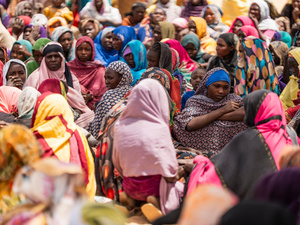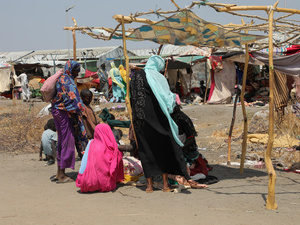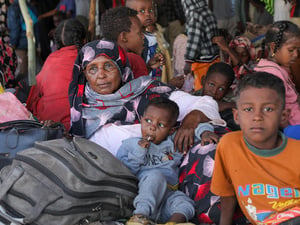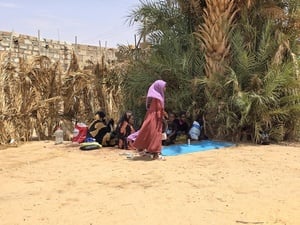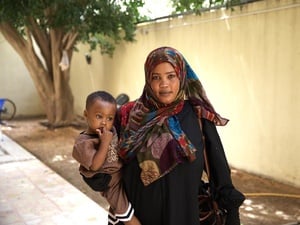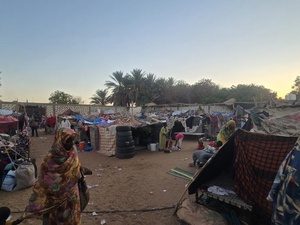Refugees struggle to get by in Tripoli
Refugees struggle to get by in Tripoli
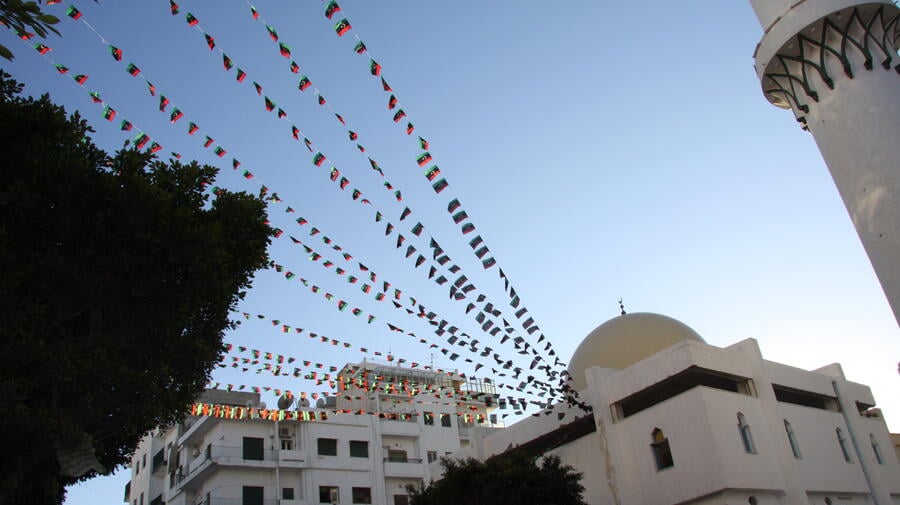
Strings of Libya's new flag flutter from a mosque in Tripoli a year after people rose against the former regime. But many displaced people were not celebrating.
TRIPOLI, Libya, May 1 (UNHCR) - When things got desperate in Libya last year, Aisha* thought of leaving and risking return to her native Iraq with her four children. But as other refugees from Iraq and elsewhere crossed into Tunisia, red tape and rigid officials prevented her from following.
Today, she's back in Tripoli, trying to provide for her children after a traumatic 20 months that began with the tragic death of her husband, Abdul, followed by the Libyan uprising against Muammar Gaddafi. "The main challenge now is that we don't have a stable income," she stressed. It's a problem facing many refugees and asylum-seekers in Libya, some of whom have also started facing eviction threats and redundancy in recent months.
But though Aisha worries about the security situation and finances, she no longer thinks of Iraq. "I have nowhere else to go to. So I have to keep some positive feelings about living in Libya," the 45-year-old told visitors from UNHCR, which monitors her family as part of its protection activities.
Aisha and her children are among almost 6,700 refugees and 2,700 asylum-seekers from about 20 countries registered with UNHCR in Libya, though the true figure could be considerably higher. Most stayed in Libya during last year's crisis, with about 1,200 seeking shelter in Tunisia and Egypt.
The Iraqis form the largest group (3,100 refugees and asylum-seekers), followed by Palestinians, Eritreans, Sudanese and Somalis. UNHCR believes up to 10,000 Syrians have entered Libya recently.
The refugee agency stopped new registrations in June 2010 on orders from the Gaddafi regime and is currently seeking a new agreement with the interim Libyan authorities. But it monitors the situation of refugees and provides assistance with international and local partners, including health care, psycho-social counselling, cash assistance, non-food items and dry food packages. UNHCR also helps find jobs for refugees and is setting up a community centre to help make refugees self-reliant with vocational and training opportunities.
Life for foreigners during Gaddafi's rule was always uncertain because of unpredictable policies on migrant workers, who are essential to the Libyan economy. Abdul, a mechanical engineer, had come to Libya from Baghdad without a visa in 1997.
"He was an economic migrant," Aisha explained in the small, clean apartment she rents. Her oldest son, Ahmed,* 21, has his own room, her daughters aged 20 and 13 share, and Aisha sleeps in the sitting room with 10-year-old Aziz,* who was born in Tripoli but has no nationality.
The family came over after Abdul found a job. But in 2001 he was made redundant when Gaddafi decided to crack down on migrant workers during the economic downturn. Abdul was able to find a new job, but he had to accept a lower salary and had problems getting residency for the family.
Meanwhile, the family applied to UNHCR for refugee status in 2006. "We approached the office seeking protection because our presence was illegal without a resident's permit," Aisha explained, while also noting that Gaddafi had expelled thousands of Palestinians in 1995 and "we were afraid that he would suddenly expel us." The family decided that return to Iraq was not an option after deadly sectarian violence erupted there in 2006.
Life in Tripoli was not easy, but Abdul was able to provide for the family. Then one day in October 2010 he never came back from work. "He was fixing a lift in a music institute when he fell and died," a tearful Aisha recalled. "It was a shock for everyone who knew him. He was much loved."
They were still trying to get over his death when the uprising against Gaddafi's 42-year rule began the following February. "At that time, the children were in school or university. So we decided to stay in the country and face the consequences," the mother said, adding that as well as lacking a resident's permit, her Iraqi passport had expired.
"The [NATO] bombing was close," she recalled, explaining that they lived next to a major military base. "When it was hit you could see the smoke, and earth showered over the houses." All they could do was stay indoors and hope. "We even packed our luggage and slept in our clothes so we would be ready to leave immediately," Aisha said.
After the capital was captured by anti-Gaddafi forces last August, the family decided to head to Tunisia, worried about the situation in Tripoli. "We wanted to go back home," Aisha said. But border officials would not let her into Tunisia, even on humanitarian grounds, because of the expired passport.
They were stranded at the border for two days, Ahmed said, adding that Iraqi diplomats had been of little help. This reinforced his growing determination to "never ever go back to Iraq."
Now they think mainly of the present. "At the moment we have no choice but to stay in Libya," Ahmed said, adding that his resident's permit had also run out. The good thing is that because they have proof of their refugee status, the four children are exempt from school or university charges.
Moreover, their Libyan friends and neighbours have chipped in to help the family and they have received sporadic support from Abdul's old employers, while an uncle in the Czech Republic occasionally sends money. And Ahmed works in his free time for a friend who runs a shoe shop.
But Aisha suggested that they would review the options once her children had finished their education. "We don't see a prosperous future for us as Iraqis in the country," she concluded.
By Leo Dobbs in Tripoli, Libya


